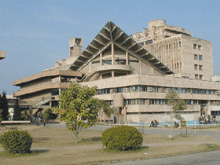The circumference of the reservations in education institutions debate has been expanded following a diktat of the Union human resource development (HRD) ministry to the directors of the country’s seven IITs to introduce reservations for SCs (15 percent), STs (7.5 percent), and Other Backward Classes (27 percent) in faculty appointments with “immediate effect”.
The government order dated June 9 signed by Seema Raj, director (technical education) in the HRD ministry says: “I am directed to say that the matter relating to reservation of SC, ST, OBC categories in recruitment to teaching (faculty) posts in the IITs was considered in the second meeting of the SCIC (Standing Committee of IIT Council) held on February 11, 2008. The recommendations made by the SCIC have been accepted by the chairman of (the) IIT Council. Accordingly it has been decided to implement reservation for SC, ST, OBC in recruitment to teaching (faculty) posts in IITs with immediate effect.”
Evidently the HRD ministry took care to prepare its case. It first raised the issue at the meeting of the Standing Committee of the IIT Council, the apex body which governs all the IITs, and obtained its approval for enforcing faculty quotas. The SCIC recommendation was later accepted by the chairman of the IIT Council. Moreover the order is consonant with the broad social consensus created on reservations, including those for OBCs, recently upheld by the Supreme Court.
 Nevertheless according to a news report in The Times of India (June 28), the IIT directors are “livid” with the ministry. They have accused it of encouraging teachers to “use the caste flag to get in”. Unnamed IIT directors are quoted as saying that social group-based reservations will damage the quality of education in these “centres of excellence”, which are among the handful of Indian institutions of higher learning to make it to the list of top 500 such institutions globally. One of the directors has been quoted as saying: “Some of the finest people have given up top positions and fat cheques… to come and teach at the IITs… With reservation in faculty positions, I see a day, not far from now, when the IITs will crumble.”
Nevertheless according to a news report in The Times of India (June 28), the IIT directors are “livid” with the ministry. They have accused it of encouraging teachers to “use the caste flag to get in”. Unnamed IIT directors are quoted as saying that social group-based reservations will damage the quality of education in these “centres of excellence”, which are among the handful of Indian institutions of higher learning to make it to the list of top 500 such institutions globally. One of the directors has been quoted as saying: “Some of the finest people have given up top positions and fat cheques… to come and teach at the IITs… With reservation in faculty positions, I see a day, not far from now, when the IITs will crumble.”
According to Dalit leaders, the IITs have a long history of resisting and opposing affirmative action. Way back in the 1960s, they used to actively discourage Dalit (scheduled castes) and Adivasi (scheduled tribes) students from enrolling. The few SC and ST students who managed to get in despite heavy odds were subjected to discri-mination, insult and humiliation — to the point of acute clinical depression, sometimes forcing them to quit altogether.
It’s only very reluctantly and belatedly that the IITs began to accept that reservations for the underprivileged in admissions or jobs are inevitable, but only for students and administrative staff. Now they are opposing quotas for faculty positions, insisting that the most meritorious faculty will be turned away.
“One thought that all such arguments were put to rest by the affirmative action debate that has raged since 1990,” says a long-serving professor at IIT Delhi who would like to remain anonymous. “But the IITs, with their ultra-conservative culture, have remained bastions of privilege, and worse, prejudice.”
“There is a problem involved in defining merit,” says Kamal Mitra Chenoy, professor at Jawaharlal Nehru University, Delhi. “Merit is often measured by examination success. It is confused with the ability to anticipate and answer questions in objective tests within a short period of time. It has very little to do with comprehension, depth of thinking, holistic analysis, or competence in relation to the subject involved.”
According to Chenoy, upper castes which continue to rule the roost by virtue of birth delude themselves that they alone have merit. “This seems to be true of the IIT faculty too. The sooner they give up the delusion, the better it will be for society, and for quality education itself,” he adds.
Stand by for another round of confrontations on the OBC reservations issue.
Praful Bidwai (Delhi)